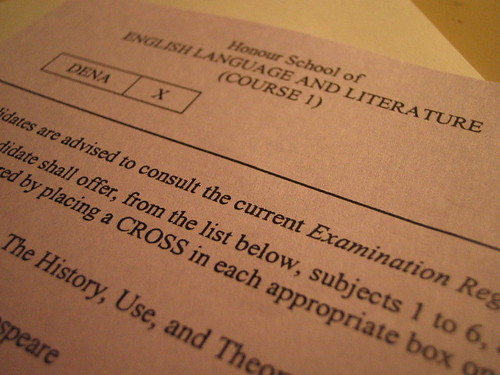The wrap
I'm actually relatively free tonight, but I can't seem to function at 100% past 10pm anymore. Otherwise, there would have been a post on John 1 tonight, but instead I thought I'll just bring you a long overdue wrap:
• 2 articles in Boundless about a month ago were really good for me - Craving Crisis expresses the same sentiment as the Clinton quote below, and reminds me at the same time that procrastination is not a good thing. And good ol' Prof Theophilus really brought out the differences between the penalty of guilt and the penalty of consequences.
• Similarly, in light of the free-for-all wrestling arena that is the internet, I thought Eternal Perspectives rightly indicted some of our attitudes and perceptions in two posts here and here.
• This year's incoming student president of Ivy League Dartmouth College happens to be a Christian, and he gave a really courageous speech in his opening address, which, however, seemed to have caused some controversy. You can read the speech in full as well in that link. (It's short.) Personally, I'm applauding him - it's well-pitched and passionate.
• I really should read Ps. Tod Bolsinger more - as it stands, I only surf to his site on occasion. He's got a nice little piece on the limitations of blogging.
• Doug Groothuis rails against multi-tasking. Check out the comments too.
• Scot McKnight was doing a series on 'what is the gospel?' which I haven't had the time to really read through but I think his epilogue to the series is right on the mark. In it he makes some observations on how we inadvertently distort the gospel, and I agree, we need to see the whole scope of God's story, from Creation to Consummation.
• Closer to home (well, not for me though), SK has 2 posts which stand out to me, Making of the Vision-Carrier (which probably strikes home a theme that God seems to want to make clear to me) and the 2 categories of weeping Christians.
[Recommended for broadband users only]:
• Curry and Rice Girl - So what happens when Indian parents decide to engage in a little bit of matchmaking? Wildly entertaining. A parody of Gwen Stefani's Holloback Girl.
• Internet Down - It was a normal day, until the internet went down... (do you see hints of yourself?)...
• 2 articles in Boundless about a month ago were really good for me - Craving Crisis expresses the same sentiment as the Clinton quote below, and reminds me at the same time that procrastination is not a good thing. And good ol' Prof Theophilus really brought out the differences between the penalty of guilt and the penalty of consequences.
• Similarly, in light of the free-for-all wrestling arena that is the internet, I thought Eternal Perspectives rightly indicted some of our attitudes and perceptions in two posts here and here.
• This year's incoming student president of Ivy League Dartmouth College happens to be a Christian, and he gave a really courageous speech in his opening address, which, however, seemed to have caused some controversy. You can read the speech in full as well in that link. (It's short.) Personally, I'm applauding him - it's well-pitched and passionate.
• I really should read Ps. Tod Bolsinger more - as it stands, I only surf to his site on occasion. He's got a nice little piece on the limitations of blogging.
• Doug Groothuis rails against multi-tasking. Check out the comments too.
• Scot McKnight was doing a series on 'what is the gospel?' which I haven't had the time to really read through but I think his epilogue to the series is right on the mark. In it he makes some observations on how we inadvertently distort the gospel, and I agree, we need to see the whole scope of God's story, from Creation to Consummation.
• Closer to home (well, not for me though), SK has 2 posts which stand out to me, Making of the Vision-Carrier (which probably strikes home a theme that God seems to want to make clear to me) and the 2 categories of weeping Christians.
[Recommended for broadband users only]:
• Curry and Rice Girl - So what happens when Indian parents decide to engage in a little bit of matchmaking? Wildly entertaining. A parody of Gwen Stefani's Holloback Girl.
• Internet Down - It was a normal day, until the internet went down... (do you see hints of yourself?)...
Labels: the wrap















